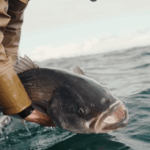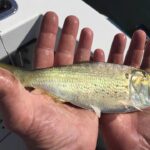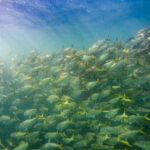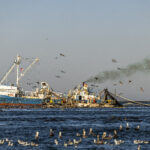
Release Mortality Revisited: New Research from Massachusetts DMF
Feature Photo Credit: Robbie Tartaglia What’s going on? For decades, striped bass management relied on a
By Tony Friedrich, VP/Policy Director
False albacore (albies) have arrived in Nantucket Sound and so have our tagging teams, eager to get started on our acoustic tagging study to learn more about the species (you can also check out our podcast). We got the text a few days ago from Dr. Jeff Kneebone at the New England Aquarium: “One tag down, 49 to go!” While not the same as “The eagle has landed,” it was still pretty darn cool to realize that all this work is coming to pass. Jeff was on board with Capt. Mike Hogan of Hogy Lures. You couldn’t ask for a better team.
None of this would have been possible without our sponsors (see image above). It is a heck of a thing to have so many top brands willing to donate funds and resources to our harebrained ideas. Their trust in the ASGA team is enormously appreciated. When you make your purchasing decisions, please consider the companies that are helping to support the science needed to better manage our fisheries.
Behind the scenes, we have been working our butts off trying to get everything right. A quarter of a million-dollar project comes with a great deal of responsibility. The folks at the New England Aquarium had to develop, design, and build a contraption that would immobilize and properly position the albies for tag surgery while flushing sea water over their gills. The Mr. Fix-It dad in me was impressed! Scheduling for trips, coordination with our awesome sponsors, logo designs, podcasts, blogs, and another ten things I am forgetting all had to get done. Now all we have to worry about is catching notoriously tricky fish in notoriously fickle fall New England weather. What could possibly go wrong?!
Conventional (Spaghetti) Tagging in The Works
There is even more exciting news to announce. We have teamed up with NOAA Fisheries’ Southeast Fisheries Science Center to deploy spaghetti tags in albies up and down the coast. Spaghetti tagging is a high volume and low yield (recapture rate) endeavor. Our hope is that recaptured tagged fish will give us a sense of albie movements, which could complement our acoustic tagging work in Nantucket Sound.
The nylon anchor tags we’ll be using are a little different than the commonly used T-bar type tags some readers might be familiar with. Nylon anchor tags include a dart system that closely resembles something a Neanderthal might have used to kill a mastodon. The problem with all the tuna species is that they move around. A lot. Due to their speed and biology, tuna can throw a tag like nothing else. The only solution out there is a nylon anchor tag. It kind of defeats the purpose if the tag doesn’t stay in.

Due to the type of tag and deployment system, we decided to hand-pick guides from our membership based on their tagging experience and location. ASGA wanted as much geographic coverage as possible, so we picked guides all along the coast from Massachusetts to Florida. We do plan to expand this work to more individuals. The smart play right now is to start slow and learn from the process before we open this up.
Many people have asked us how they can help. In the next few weeks, ASGA will be asking the public for 50 Albie Tag Team sponsors. Despite our best efforts, there is a budget gap that needs to be filled. We will publish the details as soon as everything is firmed up.
The upcoming days will be filled with more tagging, more trips, and our guides up and down the coast receiving their tagging kits. There is still a ton of work to get done. In fact, we have just started. It is hard not be excited, but we still have a long way to go.

Feature Photo Credit: Robbie Tartaglia What’s going on? For decades, striped bass management relied on a

Recent developments in the 2025 Atlantic Menhaden Stock Assessment Update, released by the Atlantic States

What’s going on? The “most important fish in the sea” just exposed one of the

Mario CampoFisheries Ecologist, Southeastern Louisiana UniversityScience and Policy Associate, American Saltwater Guides Association This discussion
We rely on our members and donations to keep fighting for a sustainable tomorrow in marine conservation.
GIVE THE GIFT OF FISHERIES CONSERVATION THIS HOLIDAY SEASON. SHOP ASGA GOODS THAT FUND FISHERIES RESEARCH & ADVOCACY CAMPAIGNS
JOIN ASGA IN CALLING FOR CRITICAL MANAGEMENT ACTION AFTER YEARS OF SPAWN FAILURES & POOR MANAGEMENT.
By using this website, you agree to our use of cookies. We use cookies to provide you with a great experience and to help our website run effectively. To learn more, please review our privacy policy.
14 Responses
We had started an albie tagging project with the Littoral Society years ago. It kind of fizzled out. I’m sure they would share our tagging info with you.
We did not tag a lot of fish, I was always unhappy with the spaghetti tags they supplied.
We did however have a return!
The fish was caught and tagged off NJ coast and recusing by a commercial guy in Florida
That is very interesting! When we started this, we couldn’t find anything with the Littoral Society. We will reach out. Thanks again for sharing!
You may find this interesting..our club has been doing this for some time. https://drakemag.com/tagging-alberto/
Ed,
Really appreciate you bringing this to our attention.
If you ever want to discuss, my email is tony@saltwaterguidesassociation.org
Love what your doing as much as I ❤️ Albies!
Thank you
Appreciate the comment, Tim. Our members up and down the coast rely on these fish. If we don’t fight for them, we aren’t doing our job. (We love em too!)
Very very cool indeed!
Share it !
It’s good science , and it’s interesting and fun
In 1971 I did a Science Fair on assaying methyl mercury in salmonoids with lots of help from MDFW and local colleges . That lead to a career in science
Tag
You’re it!!!
⚓️
So happy to hear about this tagging initiative and the podcasts are great! We have a mid-late Fall albie run on the West Central Gulf Coast area of Florida (the mouth of Tampa Bay in my case), but the fish are showing up later and later every year – and now sometimes not at all. Would be happy to help with tagging should you wish.
This is awesome. Since we know so little about Albie’s it’ll be nice to gain some insight on their habits.
I really like “Tag You’re It” (used by Jim Lucas in his comment) it is a catchy phase and it makes this initiative personal. I think it needs go on a shirt with some albie art?
Thank you so much for all the great work.
Pete
We were albie fishing off Cape Lookout NC this week and by luck our guide Will Jones was one of the guides with the ASGA tagging kit. We tagged seven or eight fish so that was pretty cool to see.